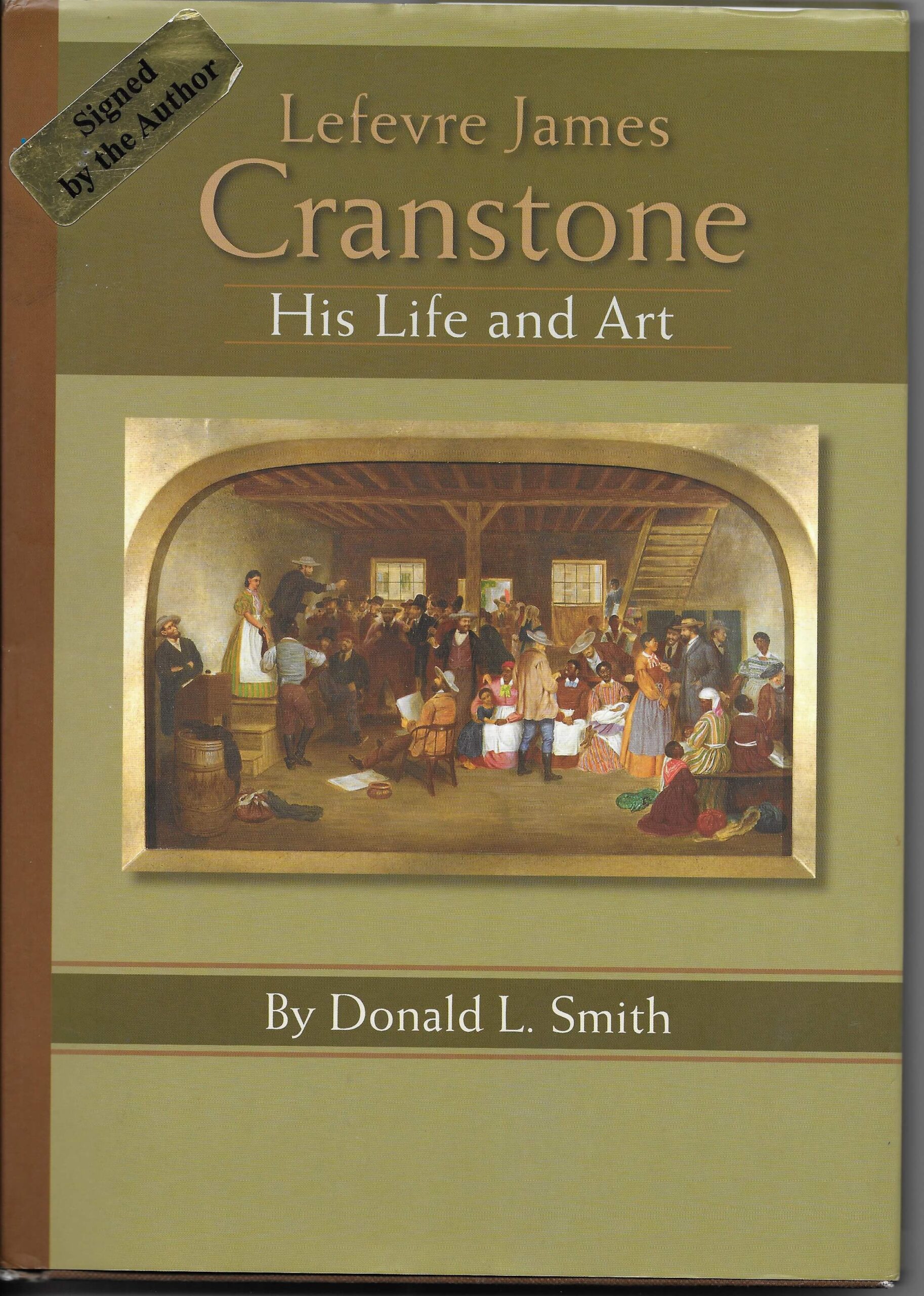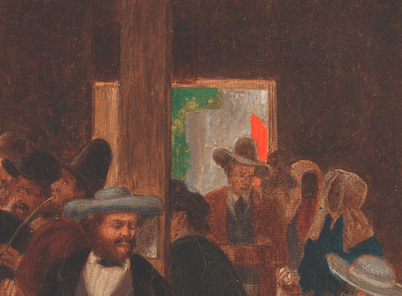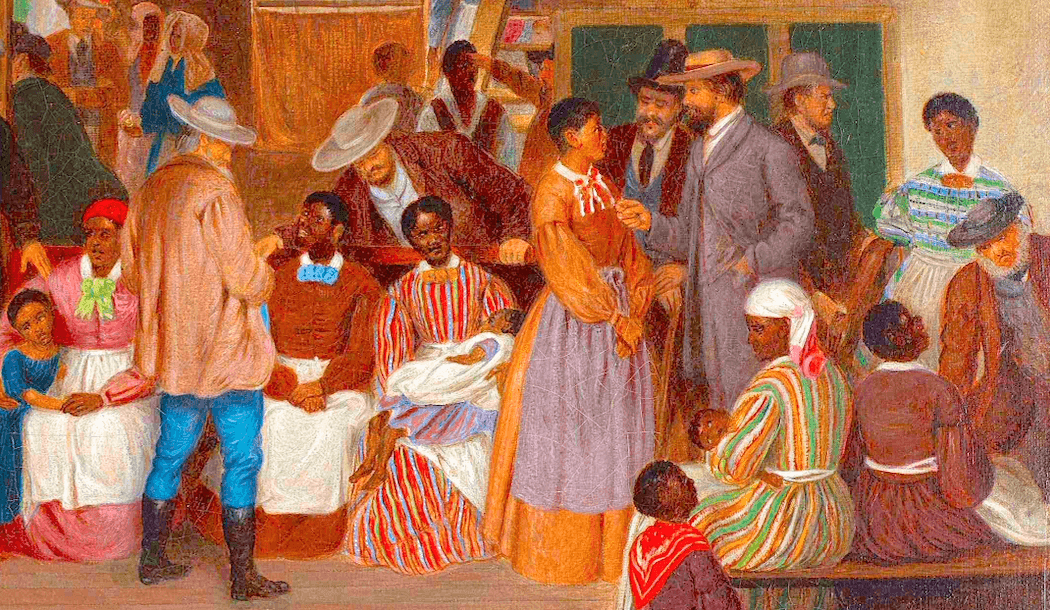
Passionate Abolitionist and
Witness to the American Civil War


Passionate Abolitionist and
Witness to the American Civil War

Slave market painter Lefevre Cranstone recorded his experiences in words as well as paint.
His biographer covers his detailed observations as well as his emotions. For convenient access, the book includes the full version of the article that the Hemel Hempstead newspaper printed.

Gentlemen, – Will you allow one who has recently returned from America to offer a few remarks on the state of that country, particularly in reference to Slavery?
The election of Mr. Lincoln as President of the United States is an event of great importance. Hitherto the Southern States by the threat of disunion have coerced the North into electing a pro-slavery President; but this time the threat has failed, and the States of Georgia and Carolina are talking loudly of seceding from the federation, but it is to be hoped that they will be wise in time and submit to the decision of the majority, without which compliance no representative government can exist.
The present state of political parties in America hangs simply on the slavery questions, and it must be a matter of rejoicing to all the friends of progress to find a party which the last few years have rendered powerful in organization and strong in numerical force, and which is backed by the greatest intellects in America, stemming the tide of slavery, and seeking to keep within its present limits the encroachments of the Democrats. The party I allude to, the Republican, nicknamed Black Republican by their opponents, have within the last few years obtained that position that has enabled them to place an anti-slavery President at the head of the Republic. Thus we have Republicans on the one hand striving to stem the tide of slavery, and the Democrats seek still further to extend it. To possess a Cuba, —to make filibustering expeditions against neighboring states, to coerce all the newly acquired territories, and by all and every means to spread slavery, are the principal points in the creed of the latter party, a party that has now governed the country for a number of years. The Democracy, hitherto so powerful, unscrupulous, and corrupt have at length failed to elect their candidate. The John Brown raid has had the effect under the influence of a reign of terror of tightening the chains of the slave, and has led to a more rigid surveillance of all suspected of abolitionism. All republican papers, even of the mildest flavor, subscribed for by men in the South, are stopped at the post-office. All post-masters have the power of seizing newspapers they choose to think contain incendiary matter, and these irresponsible individuals are not slow in availing themselves of the power which the law has placed in their hands. The New York Tribune, edited by Horace Greely, is particularly obnoxious in the South, and one seen with this paper would subject himself to the tender mercies of Judge Lynch. The boasted unanimity of the South, in opposition to Black Republicanism, is similar to that which exists in France and Austria, and which is maintained by like means. There are but very few avowed Republicans in the Slave States, simply because no one can be an active Republican and stay in them, except along the borders, unless he takes his life in his hand and holds it at the mouth of the pistol. Thousands who would subscribe for anti-slavery papers are deterred from doing so by terror. The anti-slavery party is daily defamed in fifteen states of the Union, but are not allowed a hearing in reply. The circulation of the facts whereon they rest the justification of their faith entails prosecution and punishment as for the crime of felony. To advocate their principles at all would subject the printing press to the tender mercies of mob law. The expression of any opinion bearing on this subject would expose free white men to be hunted like wild beasts. John Van Buren is said to have remarked lately that there is no despotism in Europe which could compare in cruelty and meanness with that now tyrannizing in the slave states, and gave as a reason that the European despots had such a number of subjects that they were obliged to establish some general rules of action, while an enlightened public sentiment, together with the desire of maintaining a character for generosity, had given to their conduct some show of justice and liberality. But your little one-horse despots are not restrained by any such considerations, and do not govern by anything so respectable as their absolute will—being often controlled more by the merest caprice. Many occurrences furnish evidence in confirmation of these views. John B. Brown is a farmer and dairyman residing near Washington, and has supplied a goodly portion of the citizens of Washington with milk and other necessary products of his well-cultivated land. One day last June he procured from the Post Office his papers, the “New York Tribune,” the “Baltimore Sun,” and “Washington Star”. Such is the lynx-espionage of the paramount despotism, that Mr. Brown, on his way home, was seized, searched, and for having these terrible publications in his pockets, he was hurried down to the city of Alexandria, and compelled to give bail in two-thousand dollars to escape confinement in the common jail. But many persons do not get off so easily. James Power, a working stone mason employed in the Capitol at Charleston, South Carolina, once remarked to a fellow-workman that a poor white man was not considered any better than a nigger. For this observation he was sent to the city gaol for six days, brought out and whipped half naked in the streets by a colored man, tarred and feathered, and finally put into a railway car, and sent to New York; but several times on the road a ferocious and brutal mob tarred and feathered him afresh, and he arrived finally in New York and was there when I left the country in one of the hospitals of that place. These facts are taken from several southern papers, given forth with such zest as if they thought it a capital joke. Space will not allow me to go further into details; now and then such startling things appear in the papers, making every humane man recoil with horror—tales of tarring, feathering, hanging, and burning, by Judge Lynch. We venture to say that neither Austria nor Naples, in the palmist days of their tyranny, ever exceeded these outrages upon personal freedom. And what must be the character of a social system, that shows such horror on the part of the people to read Anti-slavery publications? May we not say of such despots, in the language of an ancient volume, ‘Ye hate the light because your deeds are evil.’ Take another case just developed in Kentucky, where a son-in-law and two or three grandchildren of an aged slaveholder named Southerland have joined in a suit to compel him to continue as a slaveholder against his own conscience and will, and his relations have instituted legal proceedings to prevent him from manumitting his own slaves. The case came on for trial at the Casey Circuit Court, but was adjourned. Where are the RIGHTS OF PROPERTY, when a free white citizen is thus treated? If it is so important to secure a landholder’s right to his own negroes in Nebraska, why should not he be afforded a kindred liberty to “do as he likes with his own” in Kentucky also.
A few words as to State legislation. Take for example the state of Virginia, and the same might be applied to other slave states also, who have suffered more or less under the steady yearly encroachment of slave capital upon the personal rights of the laboring white man. The non-slaveholding farmers and mechanics, and working men of Virginia are oppressed and weighted down with taxation for the benefit of slave capitalists, merely because the latter have the political power, and choose to exercise its tyranny without mercy. Capital in the shape of slaves under Virginia Democratic legislation, is made to pay but about 300,000 dollars towards the expenses of the state, whereas, if it was taxed as other capital is, it would be made to contribute at least 1,200,000 dollars. The products of the slave labour of Virginia consisting altogether of tobacco, corn, wheat, and oats are exempt, too, from taxation, whilst the products of the white labour of the non-slaveholding part of the state, consisting of cattle, sheep, hogs &e, are made to contribute largely to the state treasury. Whilst also, the slave under 12 years of age is held by these mis-called rulers, of Virginia as privileged property, and as such is free from all taxation, though he may be worth a thousand or more dollars, the young colts, calves, lambs and pigs, of the Virginian farmers are regularly listed by the commissions of the revenue, and made to contribute to the public treasury. And whilst the owner of a slave over 12 years of age, and worth on a fair average 1200 dollars, is taxed for him the small pittance of 1 dollar 20 cents, the small merchant even with a capital as meager as 600 dollars, is made to pay the first year the onerous tax of 60 dollars, and after that an enormous percentage on his sales. And even the white labouring man, though he may own no capital at all, be he a mechanic, day laborer or only a casual hand in a harvest field, is made to contribute a percentage on his hard earned wages in order that the privileged property of Virginian taskmasters may not be compelled to pay its just share to the public expense; and wherever we turn our eyes we see this unequal and unjust exemption, following the line of slave property. Why, if a bull or a steer of a Virginian farmer becomes vicious, so as to be a public nuisance, it is ordered by the law to be killed, and the loss falls upon the owner and on him alone; but if it happens that a slave becomes vicious, and commits crime, he is hanged or transported, and it is provided by the law that his owner shall be paid his assessed value out of the state treasury. Many other aggressions of the black capitalists upon the property and labour of the non-slave-holding white men, (committed under the banner of Democracy), could be pointed out, but this is sufficient to show how ten thousand persons, simply by reason of their slave capital, have as great a representation as forty thousand of other freeman, and how they can wield the power of the state, and load the white industry of the country with burdens grievous to be borne. If the course of Virginia legislation is arbitrary to the white man, it must be conceded that slavery in that state is in a mild form. Ill-treatment of the slaves is an exception, not the rule. The master that abuses the power thus placed in his hands is amenable to the law of public opinion, and the public are not slow to stigmatize any wanton abuse of power. Unlike free negroes the slave is well fed, not hard worked, and in most cases indulgently treated.
But it is in the slave auction rooms where the horrors of the system are most palpable to the eye. No pen can adequately describe scenes so revolting to the mind of a stranger. It was in the month of March of this present year, that being at Richmond, Virginia, I turned down a back street and saw a row of dirty looking houses to the doors of which were posted red flags on which were pinned pieces of paper announcing the time of sale of the human merchandise within.

Entering one of these low dens in company with a motley crowd, the first object that met the eye was a company of coloured women and young girls, seated on benches awaiting the sale. The men and boys are placed behind a screen at the further end of the room, surrounded by an eager crowd of purchasers, each slave being stripped to the waist, that he may be tested as to soundness and bodily health. The sale room was long, dark and dingy, with a raised platform on one side for the salesman and the “lot.” Awaiting the arrival for the auctioneer these goods are freely handled and inspected. Here is every shade of complexion from purest ebony to white, black field hands, yellow beauties, stout fellows; if the buyer wishes bright-eyed, smooth of skin, supple of form, full-chested, clean-limbed creatures, culinary prodigies, deft semptresses (sic), delightful washerwomen, charioteers, unrivalled, the very treasures of commercial Christianity; the only adequate exponents of Virginian wealth and enterprise.
The women are dressed in flaunting gay colours, the men in their best trim. The auctioneer arrives, the sale commences. I see one after another mount the platform— the men first, the women and children last. And they are quickly knocked down, showing a brisk demand in the market. Whilst the sale is progressing each slave is subjected to a close examination; their arms and hands are felt— teeth inspected—made to walk up and down the room, and to mount and remount the platform.

In spite of what is so often said in contradiction to the parting of families, I was an eyewitness that such is the fact; several young children and their mothers being knocked down to different purchasers.
With a long-drawn breath I follow the crowd out, who made their way to another room, where the same scene is enacted. Day after day these scenes are going on in the midst of churches and chapels, and within a stone’s throw of a splendid monument of Washington.
For anyone who cannot immediately identify the bidder, it is the man who has positioned himself strategically under the stairs.

In traveling through the slave states one cannot help being struck with the general air of decadence and ruin in comparison with the Northern states—so prosperous in wealth and population. The blighting consequences of slavery are everywhere visible, cursing the land with its baneful effects. Public morals, and the general property of the South—which it is the province of the government to a great extent to protect and cherish—are deplorably injured by slavery, from the fact that the possession and management of slaves from a source of endless vexation and misery within the house, and waste and ruin on the farm, and that the youth of many parts of the south are growing up with a contempt of steady industry as a low service thing, which contempt induces idleness and all its attendant effeminacy, vice and worthlessness. The Southern states have already lapsed at each decade behind some of their free state rivals not possessing their natural capabilities; and unless some provision is made for the gradual riddance of this consuming evil, the American Union will never obtain its true position amongst the leading nations of the world.
I am, Gentlemen,
Your obedient servant,
L.J.C.
Ambassadors' Notes are commentaries added by the original founders of the Thomas Jackson letters and are intended to add context to the transcription that proceeds them. Other comments by visitors may have been offered in Recent Research and Commentaries in the seventh panel of the homepage.
Lefevre Cranstone and Thomas Jackson were typical of most Britishers in their attitude toward slavery at this time. Only a few decades earlier, Britain had played a major part in the slave trade and seemed comfortable about using slaves in its territories in the west indies. But for most Britishers, this went on out of sight 3000 miles away.
In 1807 the British parliament had passed the abolition of the transatlantic slave trade act. And by 1833, England had outlawed slavery in 1833 in all British colonies. So most travelers to America felt no personal moral responsibility for the continuation of slavery. And the act of personally witnessing the degradation of black people in America left impulsive feelings of revulsion that caused much self righteous motivation to support abolition.